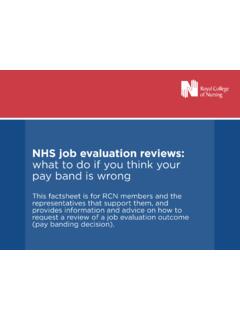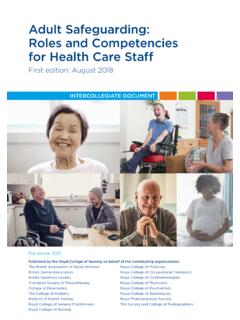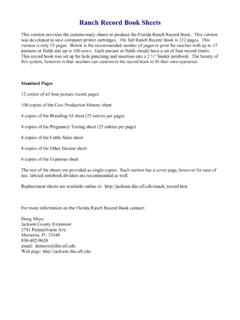Transcription of Record Keeping a Pocket Guide - RCN - Home
1 Record keepingThe factsFive reasons HCAs and APs should join the RCN today: 1. We re here for you if something goes wrong2. We support you to learn new skills3. We can help you meet like-minded people4. We ll help to make your voice heard5. You will never be aloneJoin the only nursing-specific union in the UK from as little as per month. 0345 772 6100 code: 005 343 December 2015-11-16 The registered nurse is required to ensure the HCA, AP or student is competent to undertake activity and that it is in the patient s best interests for Record Keeping to be HCA, AP or student must be trained to the appropriate standards and be competent to produce such records as part of the overall provision of is guidance on Record Keeping in the NMC Code of Conduct (2015): websites:First Steps for HCAs Learning Zone RCN 6pp Record 117/11/2015 06.
2 54 Good Record Keeping is a vital part of effective communication in nursing and integral to promoting safety and continuity of care for patients and clients. Nursing staff need to be clear about their responsibilities for Record Keeping in whatever format records are kept. Key principles Records should be completed at the time or as soon as possible after the event. All records must be signed, timed and dated if handwritten. If digital, they must be traceable to the person who provided the care that is being documented. Ensure that you are up to date in the use of electronic systems in your place of work, including security, confidentiality and appropriate usage.
3 Records must be completed accurately and without any falsification and provide information about the care given as well as arrangements for future and ongoing care. Jargon and speculation should be avoided. When possible, the person in your care should be involved in the Record Keeping and should be able to understand what the records say. Records should be readable when photocopied or scanned. In the rare case of needing to alter a Record , the original entry must remain visible (draw a single line through the Record ) and the new entry must be signed, timed and dated.
4 Records must be stored securely and should only be destroyed following your local Record Keeping can be delegated to health care assistants (HCAs), assistant practitioners (APs) and nursing students so that they can document their care. As with any delegated activity, the nurse needs to ensure that the HCA, AP or student is competent to undertake the activity and that it is in the patient s best interests for Record Keeping to be delegated. Supervision and a countersignature are required until the HCA, AP or student is deemed competent at Keeping records.
5 Registered nurses should only countersign if they have witnessed the activity or can validate that it took follow your local RCN 6pp Record 217/11/2015 06:54 Good Record Keeping is a vital part of effective communication in nursing and integral to promoting safety and continuity of care for patients and clients. Nursing staff need to be clear about their responsibilities for Record Keeping in whatever format records are kept. Key principles Records should be completed at the time or as soon as possible after the event. All records must be signed, timed and dated if handwritten.
6 If digital, they must be traceable to the person who provided the care that is being documented. Ensure that you are up to date in the use of electronic systems in your place of work, including security, confidentiality and appropriate usage. Records must be completed accurately and without any falsification and provide information about the care given as well as arrangements for future and ongoing care. Jargon and speculation should be avoided. When possible, the person in your care should be involved in the Record Keeping and should be able to understand what the records say.
7 Records should be readable when photocopied or scanned. In the rare case of needing to alter a Record , the original entry must remain visible (draw a single line through the Record ) and the new entry must be signed, timed and dated. Records must be stored securely and should only be destroyed following your local Record Keeping can be delegated to health care assistants (HCAs), assistant practitioners (APs) and nursing students so that they can document their care. As with any delegated activity, the nurse needs to ensure that the HCA, AP or student is competent to undertake the activity and that it is in the patient s best interests for Record Keeping to be delegated.
8 Supervision and a countersignature are required until the HCA, AP or student is deemed competent at Keeping records. Registered nurses should only countersign if they have witnessed the activity or can validate that it took follow your local RCN 6pp Record 217/11/2015 06:54 Good Record Keeping is a vital part of effective communication in nursing and integral to promoting safety and continuity of care for patients and clients. Nursing staff need to be clear about their responsibilities for Record Keeping in whatever format records are kept.
9 Key principles Records should be completed at the time or as soon as possible after the event. All records must be signed, timed and dated if handwritten. If digital, they must be traceable to the person who provided the care that is being documented. Ensure that you are up to date in the use of electronic systems in your place of work, including security, confidentiality and appropriate usage. Records must be completed accurately and without any falsification and provide information about the care given as well as arrangements for future and ongoing care.
10 Jargon and speculation should be avoided. When possible, the person in your care should be involved in the Record Keeping and should be able to understand what the records say. Records should be readable when photocopied or scanned. In the rare case of needing to alter a Record , the original entry must remain visible (draw a single line through the Record ) and the new entry must be signed, timed and dated. Records must be stored securely and should only be destroyed following your local Record Keeping can be delegated to health care assistants (HCAs), assistant practitioners (APs) and nursing students so that they can document their care.












